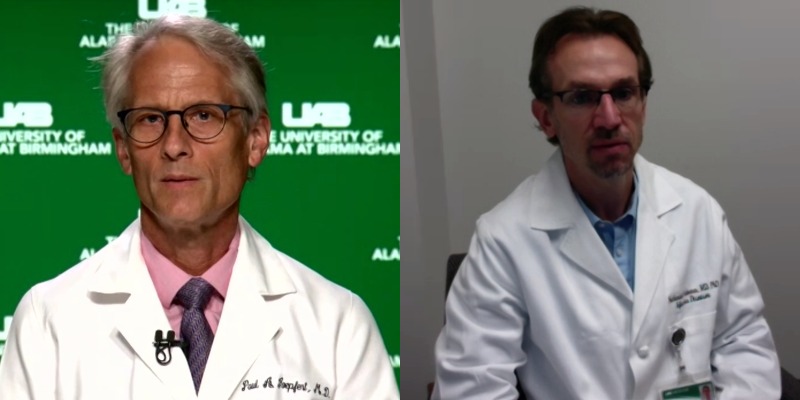UAB Hospital plans to begin conducting next month a 500-person clinical trial of one of the world’s most promising COVID-19 vaccine candidates.
Doctors Paul Goepfert and Nathan Erdmann, both of UAB’s Division of Infectious Diseases, detailed the plans to members of the media via video teleconference on Thursday morning.
UAB’s trial will test the vaccine candidate AZD1222 that was originally developed by scientists at Oxford University in England. Those researchers have partnered with the medical company Astra-Zeneca for further development and clinical trials.
The 500 patients tested at UAB will be among about 33,000 in a trial being carried out across the United States. Two people will receive the vaccine for every person who gets the placebo.
“If we get a vaccine and people take the vaccine and it works, we can go back to life before this pandemic hit us,” said Goepfert.
The doctors said they plan to administer the vaccine to a wide range of people including the elderly and those with high blood pressure.
AZD1222 is given via injection. One dose will be given, and then participants in the study come back one month later for a second dose.
The 33,000-person clinical trial in which UAB is taking part is a Phase 3 study; the last phase before widespread dispersal among the public.
“We are somewhat benefitted by the fact that we at UAB have been doing clinical vaccine trials since the 1990s, so we have all the infrastructure in place,” Goepfert commented, who added the vaccine trial is the “largest in years” at UAB.
Goepfert assured the public that the study does not include purposefully infecting anyone with the coronavirus. He said that they would target people who work in factories, nursing homes and other locations with high rates of transmission for inclusion in the study.
Results from the trial will not be available until December at the earliest, but the U.S. government is going ahead and manufacturing millions of doses to be ready for distribution should the vaccine candidate prove effective.
“The health system has responded as aggressively as possible … the scale of the outbreak is such that it puts huge pressure on the system overall. There is lots of progress being made,” said Erdmann.
An interim study of 1,000 people was published in the medical journal the Lancet on Monday.
Medical news website STATNews summarized the results, saying AZD1222 created the desired immune response in patients and is now moving “rapidly into larger-scale studies.”
The study did cause side effects “including fever, headaches, muscle aches, and injection site reactions, in about 60% of patients,” however, all of the side effects “were deemed mild or moderate, and all resolved themselves over the course of the study.”
Goepfert talked positively on Monday about the findings in the Lancet study.
He said the results led him to conclude that UAB will use two doses of the vaccine in their trial because that generated the desired amount of antibodies.
“We are very optimistic [the vaccine candidate] is going to work because it is giving us the immune responses that we think are needed,” he advised.
Henry Thornton is a staff writer for Yellowhammer News. You can contact him by email: henry@new-yhn.local or on Twitter @HenryThornton95













